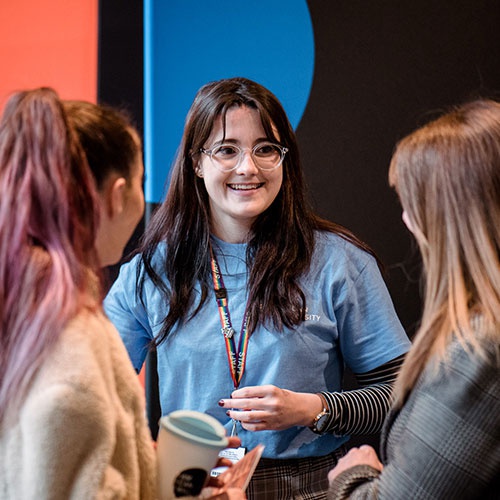Undergraduate Course
Creative Writing BA (Hons)
Write your own poetry, find your way with fiction, shape scripts, explore creative non-fiction and try your hand at experimental writing.
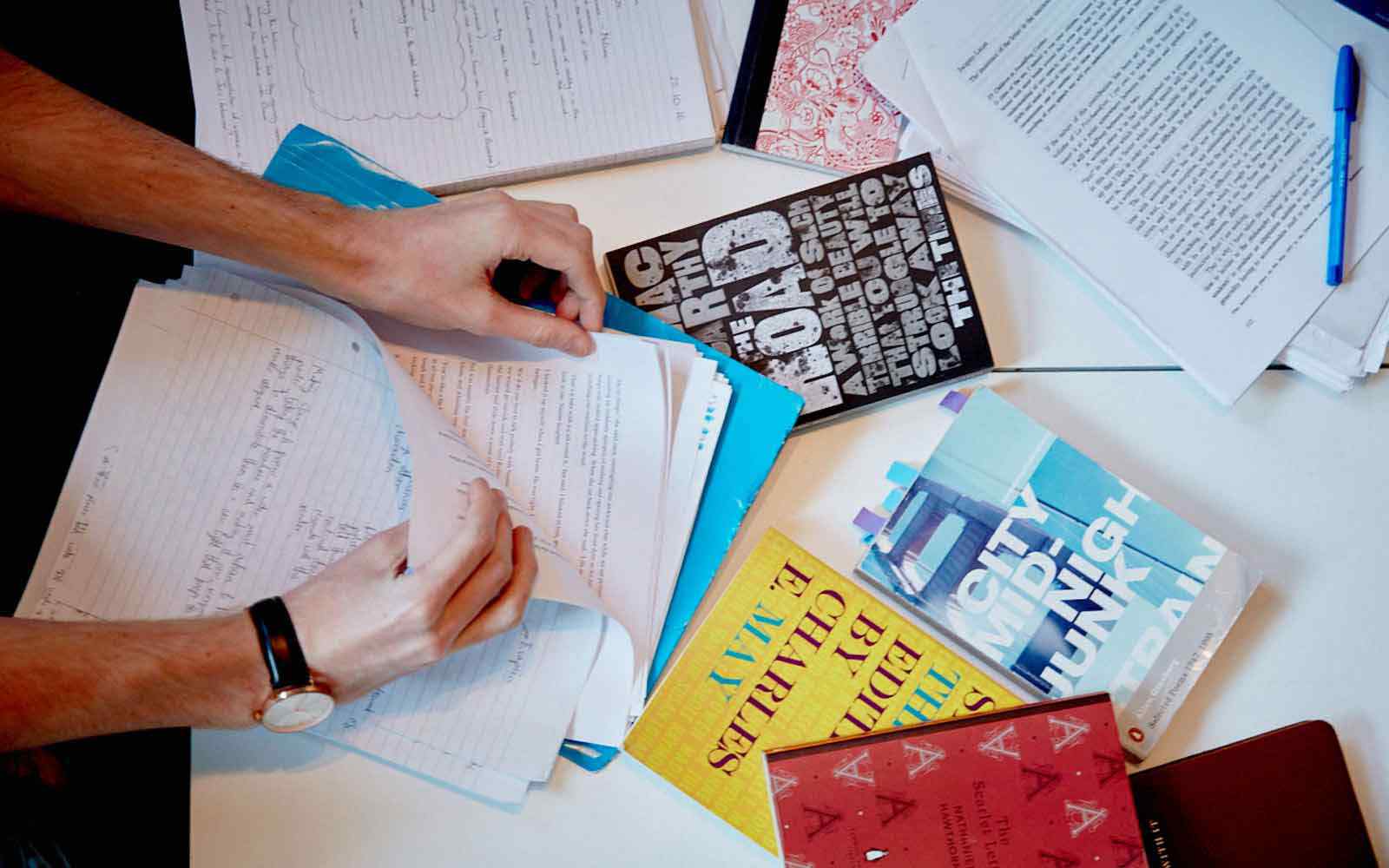
Discover your creative potential, experiment with form and genre and push boundaries with your writing. Our award winning team of writers and our supportive writing community will challenge you to develop your writing skills and find your own creative voice.
10th in the UK for Creative Writing (Guardian University Guide 2023)
100% Creative Writing students responded with a 100% positivity score for how well teaching staff supported their learning. (National Student Survey 2023)
York campus
- UCAS code – 3S3S
- Duration – 3 years full time, 6 years part time
- Start date – September 2024, September 2025
- School – School of Humanities
Minimum entry requirements
104 UCAS Tariff points
3 GCSEs at grade C/4 (or equivalent) including English Language.
Tuition fees
UK 2024 entry £9,250 per year full time
International 2024 entry £11,500 per year full time
Discover Creative Writing
Helen Pleasance, Course Lead, introduces us to Creative Writing at York St John University.
Course overview
We believe that good writing always comes from good reading. Our teaching emphasises the importance of engaging with the wider world of literature in order to develop your own style. You will study varied and fascinating writing from the past, as well as learning from contemporary writers. You will learn to read and analyse texts to develop your understanding of creative processes and apply this to your own writing.
When you study Creative Writing at York St John University you will become part of the York Centre for Writing. This is a lively, friendly community of writers which acts as a hub for producing innovative new work in the city. We have strong links with the wider literary community and publishing industry. This means you will have opportunities to enhance your learning through regular visits from industry professionals and innovators, including agents, publishers and literary activists.
Our involvement in the annual York Literature Festival gives you the chance to learn directly from popular and internationally-acclaimed writers. There are also plenty of events, performances and publications which you can get involved with throughout the year.
The skills you develop through a degree in Creative Writing matter in the workplace as much as on the page. Central to your learning are transferable skills such as:
- Communication
- Creativity
- Reflection
- Analysis
- Collaboration
Through our Working with Words: Publishing and Performance module you will gain real professional experience. This could include literary event organisation, as well as the production, editing, marketing, and launch of our annual student anthology, Beyond the Walls.
You can also choose to study Creative Writing alongside another subject:
Course structure
Year 1
Our academic year is split into 2 semesters. How many modules you take each semester will depend on whether you are studying full time or part time.
In your first year, if you are a full time student, you will study:
- 3 compulsory modules in semester 1
- 3 compulsory modules in semester 2
If you are a part time student, the modules above will be split over 2 years.
You can find out which modules are available in each semester on the Course Specifications.
Modules
Credits: 20
Compulsory module
Good writers are good readers first and foremost. This module will introduce you to theories, debates and practices in narrative, enhancing your understanding of narrative as it functions both within literature and culture generally. You will examine some of the codes and conventions that govern the production, structure, reception and interpretation of narrative, exploring films, novels, poetry and plays, from Ovid’s Metamorphoses to Hitchcock’s Vertigo. By engaging with these varied narrative forms you will consider the relationship between narrative and culture and think critically about the historical development of those forms.
Credits: 20
Compulsory module
This module introduces you to core skills in creative writing, including creating setting, poetic form, working with dialogue and characterisation. You will also develop skills in workshopping and collaborating on creative work, familiarising yourself with the workshop environment that will be central to your learning on this course. You will have the opportunity to experiment with a range of forms and ideas in group writing activities and will become more confident in sharing your work with others.
Credits: 20
Compulsory module
This module will introduce you to the variety of professional contexts you could work in as a creative writer. You will start to develop the professional skills needed to work as a writer, working to deadlines and writing to briefs. You will engage with many different forms of writing – from memoirs to scripts, graphic novels to blogs. As part of this module you will have the chance to meet a variety of inspiring visiting writers, who can share their expertise with you.
Credits: 20
Compulsory module
This module will emphasise the role of research in the production of creative work. We will introduce you to a range of research techniques to help stimulate creative projects, and to help contextualise your writing. You will use different types of research materials to generate your own work, as well as studying texts that have been produced using different research methods. You will have the opportunity to take part in creative projects based on archival work.
Credits: 20
Compulsory module
This module will help you to become more confident in working with literature at degree level. You will engage with a range of texts written before the 19th century. This includes prose, drama, poetry, speeches, letters and articles. Through this you will start to think about how literature and history can be brought together, and why the study of English Literature remains a popular and important subject.
Credits: 20
Compulsory module
On this module we will examine some well known classic texts alongside more unusual selections. These texts will help you to question the social, political, cultural and historical values through which we approach literature. This includes an exciting range of texts across different media and forms, from 19th century poetry to early cinema and 1930s nonfiction. Along the way we will consider questions of gender, class, war, empire, form, genre and much more.
Year 2
In your second year, if you are a full time student, you will study:
- 3 optional modules in semester 1
- 1 compulsory module and 2 optional modules in semester 2
If you are a part time student, the modules above will be split over 2 years.
1 of your optional modules can be a Literature module from Year 2. You can find them on our English Literature page.
You can find out which modules are available in each semester on the Course Specifications.
Optional modules will run if they receive enough interest. It is not guaranteed that all modules will run every year.
Modules
Credits: 20
Compulsory module
This work related module will develop your understanding of the relationship between creative writing practices and employability in the creative industries. It is an opportunity for you to explore the methods and means of literary publishing, production and performance, developing transferable and employable skills through project work. You will combine a broad exploration of industry aims and ethics with first hand experience of specific editorial, commercial, and practical processes.
Credits: 20
Optional module
This module is an opportunity to read and produce a range of fictional forms, from flash fictions to novellas, short stories to novels. You will develop an understanding of:
- Characterisation
- Voice
- Plot
- Narration
- Dialogue
- Point of view
By the end of the module, you will have written your own fiction portfolio.
Credits: 20
Optional module
This module will give you the opportunity to explore a range of creative nonfiction texts including:
- Memoir
- Biography
- The Creative Essay
- Hybrid Forms
- Nature Writing
You will develop your understanding of voice, structure and audience in relation to these forms and consider the blurred lines between fact and fiction in nonfiction writing. By viewing, reading a range of nonfictional texts we will ask you to make to produce your own creative nonfiction texts.
Credits: 20
Optional module
From the sonnet to the prose poem, on this module you will learn about the formal qualities of poetry and discover how to produce dazzling imagery and perfect rhythm; manipulating voice and pace. You will study a range of contemporary poets, supplemented by visits and readings from some of them. You will produce your own portfolio of work by the end of the module.
Credits: 20
Optional module
This module addresses the essential elements of scriptwriting. This includes writing convincing dialogue, creating interesting characters and constructing coherent stories. We will also introduce you to the cultural, theoretical and industrial contexts of scriptwriting. You will develop your expressive and technical skills in writing scripts for 1 or more of the following disciplines:
- Radio
- Television
- Stage and film
You will then create your own original script.
Credits: 20
Optional module
On this module we will explore the different ways books and films tell stories, and what happens to literature and literary characters when they are translated onto the screen. We will introduce you to the theory, methods and conventions behind the process of adaptation. In addition to examining specific examples of film adaptation, you can choose to experiment creatively on an adaptation project of your own, using what you have learnt.
Credits: 20
Optional module
Science Fiction has a history of encouraging readers and viewers to reflect on their post industrial choices, and consider how they have affected the wellbeing of the planet and its inhabitants. On this module we will draw on a range of critical perspectives around utopianism to approach landmark texts in the history of science fiction. You will have the opportunity to get involved with our ongoing science fiction writing project Terra Two: An Ark for Off-World Survival (https://yorkstjohnterratwo.com/).
Year 3
In your third year, if you are a full time student, you will study:
- A dissertation module studied across semesters 1 and 2
- 2 optional modules in semester 1
- 1 optional module in semester 2
1 of your optional modules can be a Literature module.
If you are a part time student, the modules above will be split over 2 years.
You can find out which modules are available in each semester on the Course Specifications.
Optional modules will run if they receive enough interest. It is not guaranteed that all modules will run every year.
Modules
Credits: 60
Compulsory module
This extended project will see you independently research, plan and write a substantial piece of creative writing. This allows you to develop technical mastery in your chosen forms and genres, as well as developing professional presentation skills. The creative work is accompanied by a Contextual Reflection which will demonstrate your analytical and research skills. You will be guided by a supervisor with expertise in the area you focus on. You also have the option to take part in a weekend residential writing retreat as part of your dissertation project.
Credits: 20
Optional module
On this module we will encourage you to consider the historical, theoretical, cultural and political dimensions of genre, as well as exploring the conventions which are attributed to specific genres. You will also be given the opportunity to critically explore differentiations between high and low culture and investigate genres such as tragedy, satire and gothic, romance, horror, and noir. The module will help you to develop an awareness of literary and generic concepts between and across different forms. Through this you will develop skills in original composition, drafting and editing.
Credits: 20
Optional module
This module is an opportunity to explore and participate in contemporary literature. You will start to develop the relationship between your creative practice and the theory, philosophy, and politics that uniform and inspire contemporary work. You will engage with writing that challenges the traditional boundaries of literature and is fresh, exciting and innovative. You will also consider a broad range of materials and techniques that will help you to develop your own innovative creative practices.
Credits: 20
Optional module
We will introduce you to a range of very contemporary publishing and literary cultures, with a view to helping you position your own work in the contemporary literary landscape. You will be encouraged to think critically about literary culture, and develop a sense of how your own work might contribute to or challenge contemporary modes of writing. The module also has a practical focus and will help you to develop a professional portfolio you can use as a springboard into your career.
Credits: 20
Optional module
On this module you will investigate how the novel form was developed, challenged, and experimented with in the Victorian period. You will consider how the novel engages with and represents social issues in the period, but also how the novel form itself adapted and transformed as a vehicle of expression. You will discover how novels transformed from realist texts which set out to depict believable and probable events and characters to varied and experimental genres, including:
- Science fiction
- The sensation novel
- Romance
- Mystery and adventure
Credits: 20
Optional module
This module examines the origins of Gothic literature and conventions, exploring how the Gothic persists and adapts to different historical and cultural contexts. We will be reading poetry and prose, drama and non-fiction throughout the module, as well as considering other media such as art, film, and sound and critical theories of the Gothic.
Credits: 20
Optional module
On this module you will investigate the theatrical experimentation that took place over the last century, and consider its impact on the contemporary stage. You will consider the major movements and perspectives of the period against the background of wider intellectual, cultural and aesthetic debates. Through this we will explore the creative dynamics between:
- Tradition and innovation
- Word and image
- Writing and performance
- Reading and spectatorship
Credits: 20
Optional module
This module will examine a selection of texts from 20th century American literature, and relate these works to their cultural, social and political backgrounds. We will focus on texts that demonstrate formal innovation and experimentation, and the selection will reflect the variety of twentieth century American experience. You will read Native American, African American and Chinese-American texts alongside literature produced in the wake of radical social change such as Beat writing, Vietnam narratives, and responses to 9/11.
Credits: 20
Optional module
On this module we will examine texts from the English speaking and Creole Caribbean, a region that has produced 2 Nobel Prize winners in Literature. We will introduce you to a range of writing from and about the Caribbean, allowing you to appreciate the longstanding global impact of this writing and how it is currently being marked and remembered. We will particularly focus on the close connections of the past and present between Britain and the Caribbean.
Credits: 20
Optional module
On this module we will explore issues surrounding gender and sexuality. We will debate whether various elements of gender are natural or cultural, as well as how different genders and sexualities are presented in film and literature. We will investigate how do different cultural groups use popular culture and literature to reinforce, challenge, transgress or disrupt traditional gender expectations. This module challenges you to draw on all of the skills, theories and approaches encountered throughout your degree to interrogate the representation of gender roles and sexuality in popular culture.
Teaching and assessment
Teaching and learning
The aim of our teaching is to help you to become a better writer. We want you to be an active learner who is engaged in every aspect of the course. You will have opportunities to share your work in progress in regular workshops. This will help you get comfortable with responding to feedback and reworking your writing. You will also take part in:
- Lectures
- Seminars
- Tutorials
- Masterclasses
- Guest events
You will typically study 3 modules each semester. Each module will normally have 3 hours of contact time each week, so you will have a minimum of 9 hours each week of teaching.
Alongside your timetabled contact time, you will need to study independently. You will need to spend time reading around the topics we cover and preparing for your taught sessions. This will ensure that you get the most out of your degree, as well as building valuable time management skills.
Our teaching draws on both our research and professional experience. This means your learning is informed by the most current thinking in the subject area. You can find out more about our research and backgrounds by visiting our staff pages.
Assessment
There are no exams on this course as we believe there are better ways to assess creative skills. You will mainly be assessed through coursework, which will often take the form of a portfolio of original writing accompanied by a reflective commentary. You will also write essays, demonstrating your skill in literary analysis. Other assessment opportunities are designed to help you develop new skills and prepare for your career. This may include:
- Project work
- Organising events and publications
- Giving presentations
Career outcomes
Your future with a degree in Creative Writing
A degree in Creative Writing can help you achieve your dreams of becoming a professional writer, but the skills you learn on this course will also be relevant to many other professions. As you explore your creativity you will also build transferrable skills in analysis, communication, team working and presentation.
This degree could be the first step toward your career as a:
- Writer
- Copywriter
- Editor
- Journalist
- Teacher
- Publisher.
Discover more career options on Prospects careers advice pages.
You could also progress onto a postgraduate degree and take your learning even further.
Postgraduate courses at York St John University
PGCE at York St John University
Further your education and work towards a rewarding career in teaching by studying for a Postgraduate Certificate in Education (PGCE) after you graduate. For over 180 years, we have worked with enthusiastic individuals who want to shape the future of young people across both primary and secondary school settings. You'll spend a lot of time in schools, developing your practice by teaching. You will graduate with Qualified Teacher Status and become part of the well respected alumni of York St John educators.
Whatever your ambitions, we can help you get there.
Our careers service, LaunchPad provides career support tailored to your ambitions. Through this service you can access:
- Employer events
- LinkedIn, CV and cover letter sessions
- Workshops on application writing and interview skills
- Work experience and volunteering opportunities
- Personalised career advice.
This support doesn't end when you graduate. You can access our expert career advice for the rest of your life. We will help you gain experience and confidence to succeed.
Entry requirements
Qualifications
Minimum entry requirements
104 UCAS Tariff points
3 GCSEs at grade C/4 (or equivalent) including English Language.
Calculate your UCAS Tariff points
International students
If you are an international student you will need to show that your qualifications match our entry requirements.
Information about international qualifications and entry requirements can be found on our International pages.
If English is not your first language you will need to show that you have English Language competence at IELTS level 6.0 (with no skill below 5.5) or equivalent.
This course is available with a foundation year
If you do not yet meet the minimum requirements for entry straight onto this degree course, or feel you are not quite ready for the transition to Higher Education, this is a great option for you. Passing a foundation year guarantees you a place on this degree course the following academic year.
Mature Learners Entry Scheme
If you have been out of education for 3 years or more and have a grade C GCSE in English Language or equivalent, you are eligible for our entry scheme for mature learners. It's a scheme that recognises non-traditional entry qualifications and experience for entry onto this course. Information on how to apply can be found on our dedicated page.
Terms and conditions
Our terms and conditions, policies and procedures contain important information about studying at York St John University. You can read them on our Admissions page.
Fees and funding
To study for an undergraduate degree with us, you will need to pay tuition fees for your course. How much you pay depends on whether you live inside the UK, or internationally (outside the UK). Tuition fees may be subject to inflation in future years.
UK 2024 entry
The tuition fee for 2024 entry onto this course is:
- £9,250 per year for full time study
- £6,935 per year for the first 4 years if you study part time
These prices apply to all UK, Jersey, Guernsey and Isle of Man students
You can find out more about funding your degree by visiting our funding opportunities page:
Placement year funding
If you choose to take a placement year, and your course offers it, you can apply for the Tuition Fee and Maintenance Loan for your placement year. How much you are awarded is based on the type of placement being undertaken and whether it is a paid or unpaid placement. The tuition fee for your placement year will be reduced.
Tuition fees
UK 2024 entry £9,250 per year full time
International 2024 entry £11,500 per year full time
International 2024 entry
The tuition fee for 2024 entry to this course is £11,500 per year for full time study.
This price applies to all students living outside the UK.
Due to immigration laws, if you are an international student on a Student Visa, you must study full time. For more information about visa requirements and short-term study visas, please visit the International Visa and Immigration pages.
Find out more about funding your degree:
Additional costs and financial support
There may also be some additional costs to take into account throughout your studies, including the cost of accommodation.
Course-related costs
While studying for your degree, there may be additional costs related to your course. This may include purchasing personal equipment and stationery, books and optional field trips.
Study Abroad
For more information on tuition fee reductions and additional costs for studying abroad, please visit our study abroad pages.
Accommodation and living costs
For detailed information on accommodation and living costs, visit our Accommodation pages.
Financial help and support
Our Funding Advice team are here to help you with your finances throughout your degree. They offer a personal service that can help you with funding your studies and budgeting for living expenses.
For advice on everything from applying for scholarships to finding additional financial support email fundingadvice@yorksj.ac.uk.
Course highlights
Unique work experience
On the Working with Words module you can get involved in editing, designing and publishing our annual anthology of student fiction and poetry, Beyond the Walls.
York Centre for Writing
When you join us you will become part of York Centre for Writing - a hub of exciting writing events, projects and publications run in collaboration with Valley Press and York Literature Festival.
Find your creative voice
With specialist modules in fiction, non-fiction, script writing, poetry and more, there are plenty of chances to experiment with new forms and genres.
Where ideas grow
Read some of our students' work and find out all the news from Creative Writing at York St John University on our blog.
Lewis Creative Writing
Beyond being knowledgeable and excellent teachers, the lecturers here have a genuine passion and interest for the subject, and are very up to date with the scene as active writers and readers. They are genuinely enthusiastic about their students and their own work, and provide endless support. The course itself is incredibly diverse in the modules it offers. There is always something you will enjoy each semester or something you will come to enjoy thanks to the excellent course materials and teaching. I also found the assignments to be flexible, providing me with options to approach the course in my own way. The university is incredibly forward thinking and always adapting to ongoing changes.
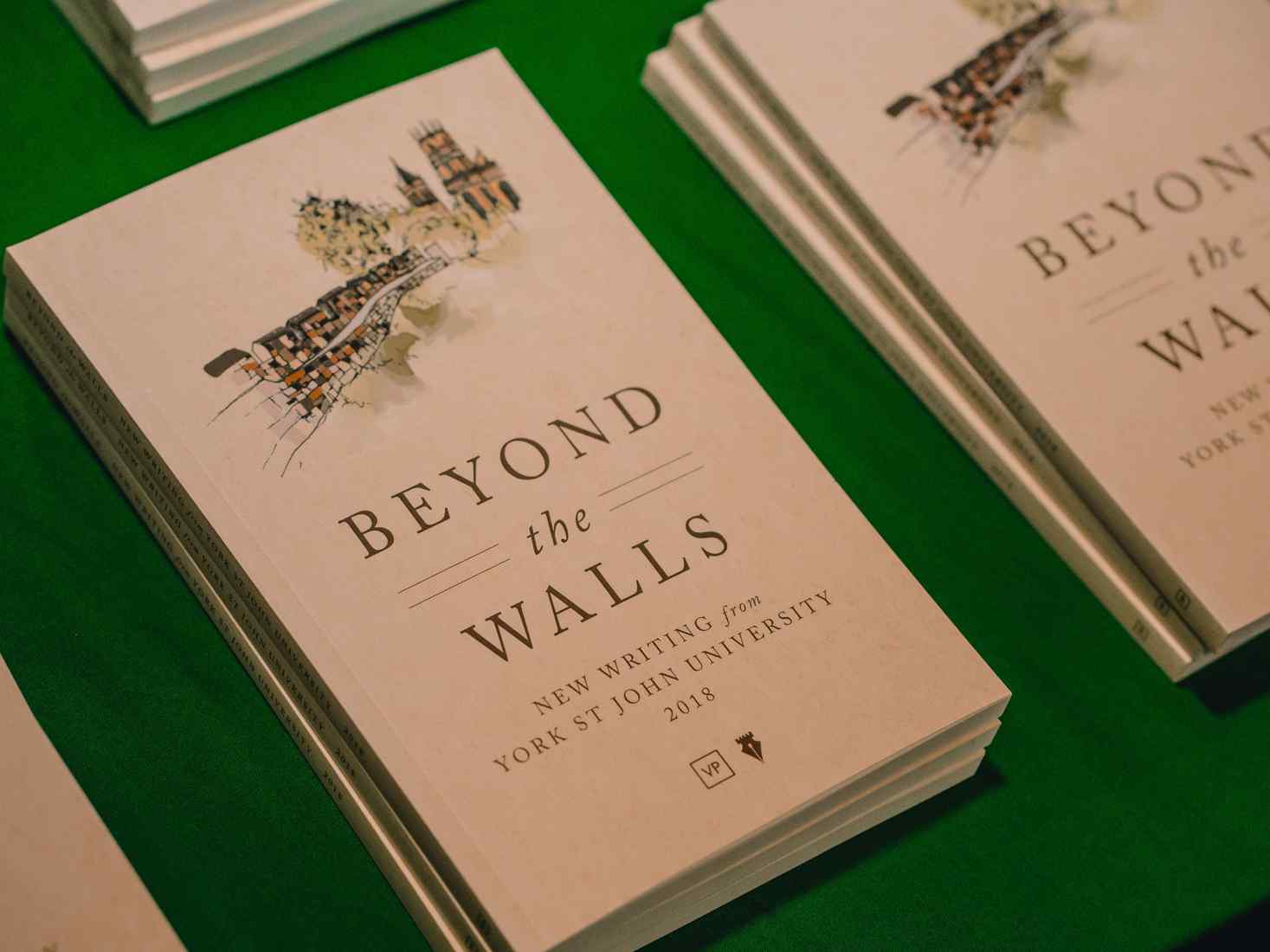
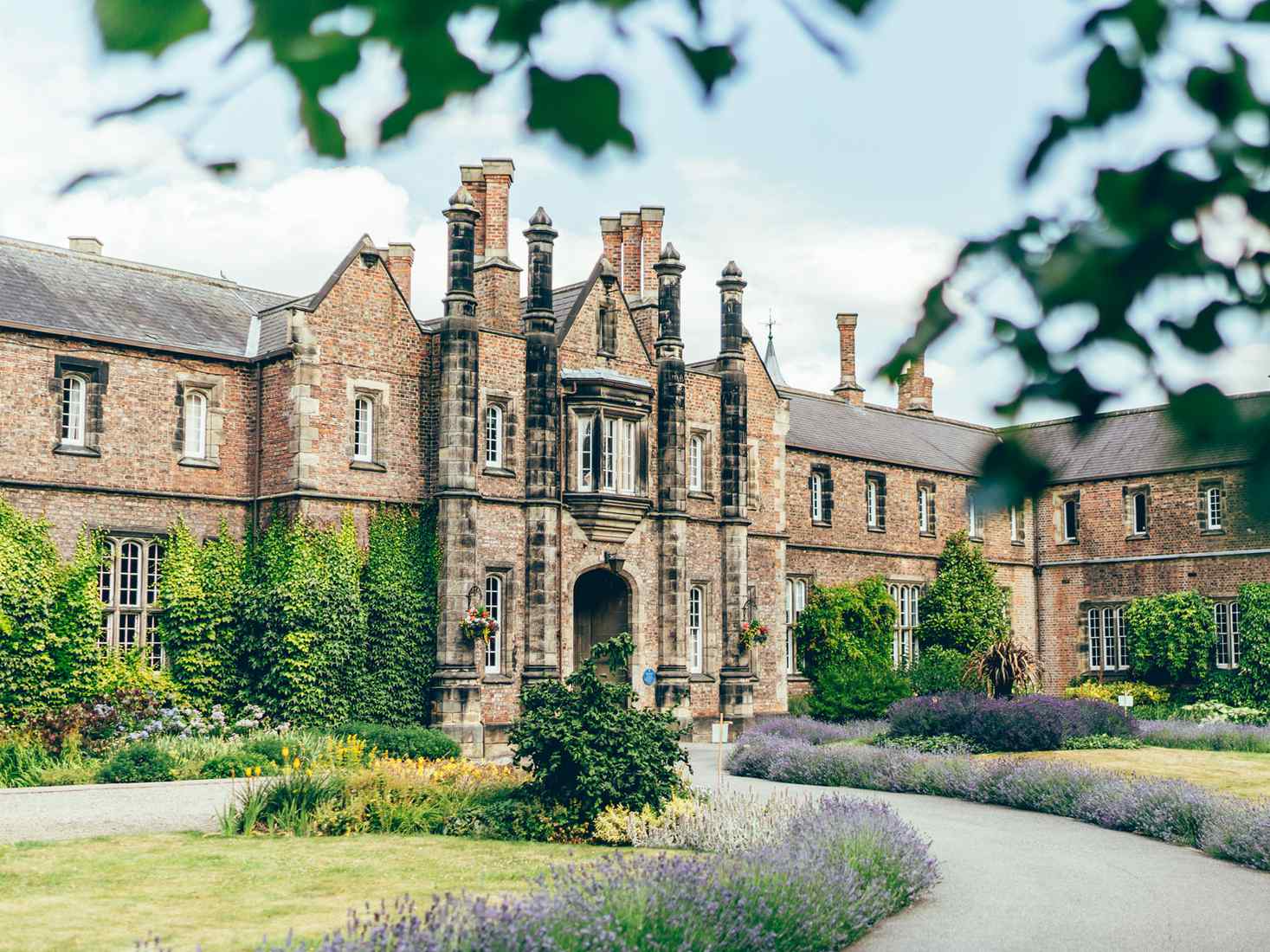
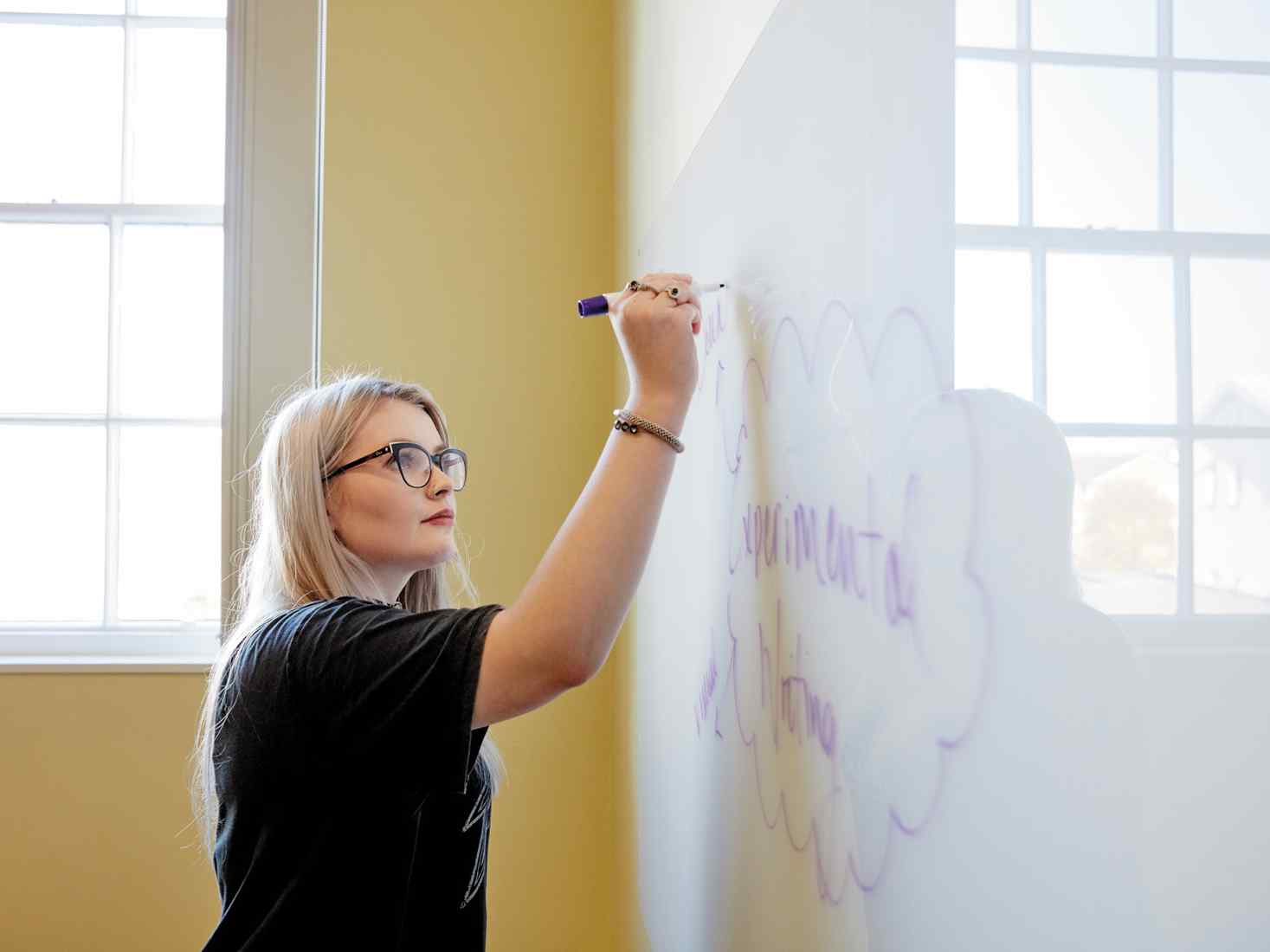

.jpg)
